Decorated with a Vir Chakra for leading an attack that destroyed four tanks, Risaldar Ayub Khan shared a name with the Pakistani president who ordered the invasion of India in 1965.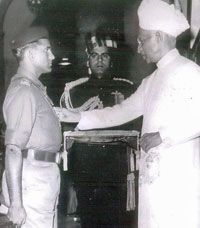
India's Ayub came from a family of soldiers and made his country proud. He was also a two-time MP. Prakash Bhandari met the 82-year-old war hero at his ancestral home in a Rajasthan village.
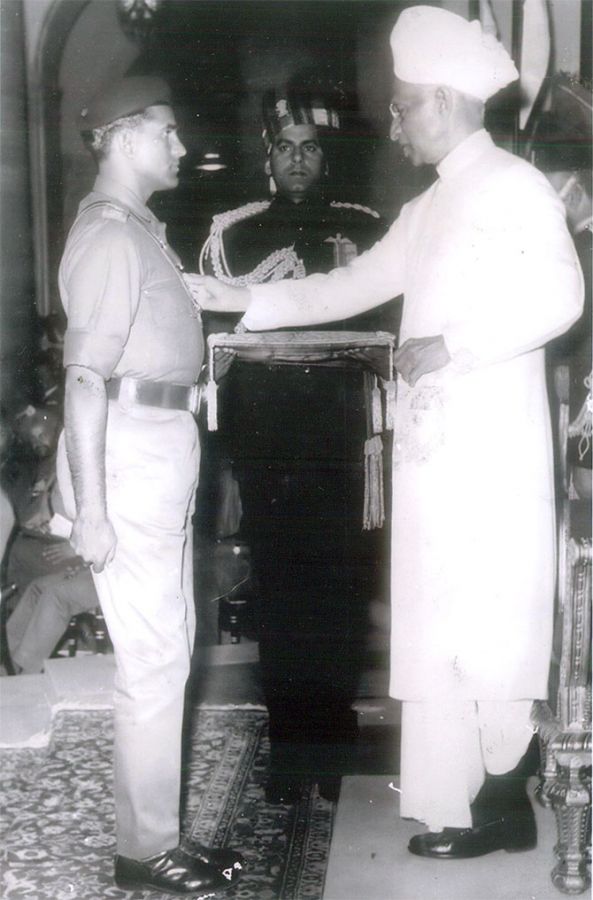
Rashtrapati Bhavan, New Delhi, 1965. The brave men of the Indian armed forces are being recognised for their valour in the war with Pakistan.
Risaldar Ayub Khan of the 18th Cavalry, an armoured regiment, is among those decorated with a Vir Chakra that evening for showing exemplary courage in the war.
At the investiture ceremony, President Dr S Radhakrishnan, Prime Minister Lal Bahadur Shastri and Defence Minister Y B Chavan are present.
Shastri<em<ji says he never met General Ayub Khan, the president of Pakistan, but India is proud of our own Risaldar Ayub Khan, who along with his men destroyed four Pakistani Patton tanks and captured one tank in the Sialkot sector of Jammu-Kashmir.
the prime minister's praise for Ayub Khan is greeted with thunderous applause. After the investiture ceremony, Shastriji hugs Risaldar Ayub Khan.
From then, the soldier is called 'Indian Ayub' by the media.
"After the war, it was the most historic moment for me and my family," says the 82-year-old soldier who was promoted to honorary captain and now lives with his family in the Nuah village of Rajasthan.
"My father Imam Ali Khan, who also served the 18th Cavalry as regimental dafedar major where I also served, was very happy to see my decoration. We come from a family of Kayamkhani Muslim soldiers. My entire family served the army."
Nuah is located about 153 kilometres from Jaipur in Rajasthan's Jhunjhunu district. It has a population of 5,000, a majority of whom are Muslims. Most either serve in the army or in the police.
Captain Ayub Khan is a well-known name in Jhunjhunu district, which sends two, three people from each house to the army. More than 3,000 soldiers from the district died in World War II.
The war hero was twice elected to the Lok Sabha and served as Union minister of state for agriculture in the P V Narasimha Rao government.
His ancestral village home has been the family's house for several centuries. The kutcha house was recently replaced by one made of concrete.
The house is sparse. Visitors sit on cots in a small room which serves as a drawing room, which has a large laminated photograph of the captain being awarded the Vir Chakra.
"In the Kayamkhani Muslims when a child is born, a sword is kept besides him. The sword is symbolic and a reminder that he has to be a soldier and should be ready to sacrifice his life for his masters," says Captain Ayub.
"In our case, the armed forces were our masters and I was told by my father and grandfather to fight for the country. India is our motherland."
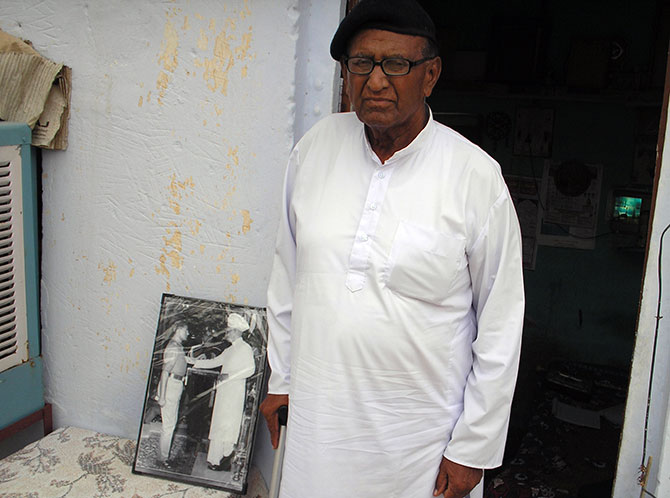
The war hero returned from New Delhi after attending Shauryanjali, the exhibition showcasing the major battle scenes of the 1965 War. "I was an honorary captain and retired as a junior commissioned officer. I felt a little embarrassed when a brigadier rank officer opened the door of my car when I had gone to attend the function wearing the Vir Chakra and other medals on my chest. The army gave me honour and this honour came because I was a decorated soldier."
He says he gets three kinds of pension: One as a retired soldier, the other as a Vir Chakra awardee and the third as a former member of the Lok Sabha.
The Rajasthan government gave him 25 bighas of land for his Vir Chakra. "I was offered a house in Jaipur and Jhunjhunu as a member of the Lok Sabha, but I refused. I am happy in my small village house," he says.
Captain Ayub joined the army in 1950 when he was just 17. Recruited in Ahmednagar, he was declared the best cadet during his training as a sepoy.
The Indian invasion of Pakistan in the Sialkot sector began on the night of September 7/8, 1965 and the 26th Infantry Division was ordered to capture Sialkot.
The 18th Cavalry's Bravo squadron was led by Risaldar Ayub Khan and was ordered to clear the Sialkot road from Pakistan's occupancy.
"We had old Sherman tanks. The Pattons were equipped with anti-aircraft guns, which meant that an air attack from our side was not possible," he remembers.
"We opened fire on the Patton. The Pakistan army had the best equipment, but it was manned by poor soldiers who had no courage to fight."
"We were sitting duck targets for the enemy, but were just too quick for him. Our troops destroyed four tanks. Many Pakistani tanks were damaged."
Captain Ayub and his men then faced an air attack by four Pakistan fighter jets in formation. A shell fell near him, but he escaped unhurt. After losing four tanks, the Pakistani army retreated.
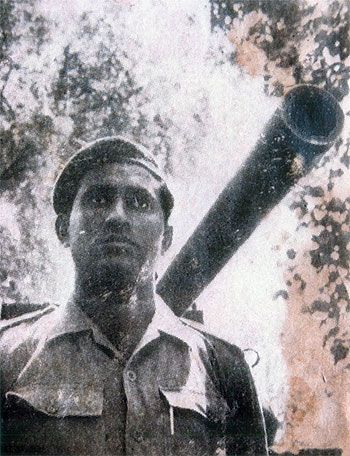
The clearing of the Jammu-Sialkot road led the Indian Army to the mouth of Sialkot which was barely five kilometres away.
"Just a day before the ceasefire, the Pakistanis made a tremendous effort to recapture the Alhar railway station, but in vain. Even after the ceasefire, they tried to bring a railway bogey full of armed men in civilian clothes. But on being threatened by our commander that the so-called train would be blow up by dynamite, the engine had to be shunted back for over ten miles," recalls the captain.
When the ceasefire was announced India controlled over 90 Pakistani villages, three vital traffic links and an important railway station. A most conservative estimate of enemy tank losses pits the figure around 240 Pakistani tanks. Some of these tanks are on display in many parts of the country. India lost less than 50 tanks.
In 1983, Ayub Khan retired from the army and was given the rank of honorary captain.
When he returned home, he was received as a hero by the villagers of Nuah. Rajiv Gandhi was the prime minister and on his personal initiative, the Congress party gave Captain Ayub Khan a ticket to contest the Lok Sabha election from Jhunjhunu.
For Captain Ayub, politics was a different ball game. He chose to wear a white kurta-pyjama and sported the black army cap of the 18th Cavalry minus the crest. He fought the election like a true soldier and became an MP.
It was the first time that a Muslim from Rajasthan was elected to the Lok Sabha. Captain Ayub won two consecutive elections.
"When I became a Union minister, a number of generals used to come and meet me and salute me. I often found it very embarrassing as I was a mere jawan in the army," he says.
"As a Union minister for agriculture, I stressed on higher agriculture production and did a lot for the farmers with negligible irrigation facilities. I opened 19 Krishi Vigyan Kendras in the country."
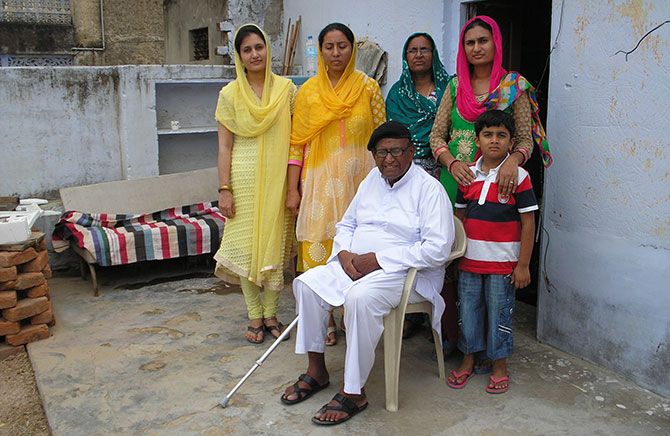
Now 82, Captain Ayub stays at home and enjoys family life. He is no longer active in politics and says he dislikes the politics of caste and found himself to be a political misfit.
Happy that the Modi government has agreed to grant one rank one pension, he feels the government must do something to attract bright young people to serve the armed forces.
OUR SPECIAL SERIES: THE 1965 WAR, 50 YEARS LATER
- India has still not learnt that single lesson of 1965
- Why did India give back Haji Pir pass to Pakistan
- 'I hate these Pakistanis'
- A martyr's family remembers
- Pakistan should never consider India weak
- 1965 decided the fate of the subcontinent
- 'When we fight a war we forget the danger'
- A grateful nation and a proud school
- The Hero of the Battle of Dograi
- My Father, the Param Vir Chakra Winner
- My salute to arguably India's greatest military hero
- Param Vir Chakra Abdul Hamid, a Hero's Hero
- Asal Uttar, the battle that turned the tide of the 1965 war
- The daredevil fighter pilot who survived a Pakistani bullet
- Two wars and a romance
- The war that helped India regain its military confidence
- The central lesson from the '65 war
- The general who saved Punjab in the '65 war










